The Calgary Flames moved to southern Alberta in the summer of 1980 and are in the middle of their 43rd season. Throughout its history, they have won a Stanley Cup championship (1989) and qualified for the Final on two other occasions, in 1986 and 2004. Furthermore, to stay competitive, team executives must be proactive at the Entry Draft and through free agency to build a roster that wins. If they need help finding the necessary pieces through those two channels, there is always the trade market.
Related: Calgary Flames | Five Historic Trades That Ignited the Franchise
The 2023 NHL Trade Deadline is fast approaching on March 3. Thus far, the Flames have yet to make any moves despite being outside the playoff picture in the final days leading up to the deadline. Although they are not attached to any high-profile players, there are a handful of rumors we could talk about, but we would be repeating the same stories and headlines from all the primary sources.
Instead, we will take a trip back to revisit all 313 trades the Flames have executed since their move to Alberta in 1980 and discuss five fascinating facts that diehard fans have never thought about or known. This article does not include any transactions from the Atlanta Flames years 1972 to 1979. Additionally, all information discussed in this article was obtained and sorted by nhltradetracker.com.
The Flames Orchestrate More Trades In-Season Than in the Offseason
Most people would assume that a professional sports organization would utilize its respectful trade deadlines and, whether they are buying or selling, phone in any deals before the clock hits zero. Considering the NHL Trade Deadline is usually in late February or early March, it is no surprise that two of the Flames’ busiest months are February (35 trades) and March (58).
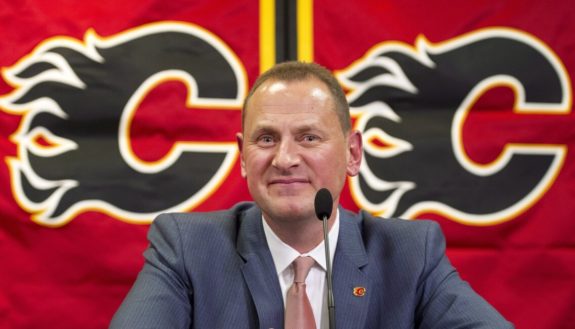
Since a typical NHL season begins in October and ends with a Stanley Cup celebration in June, the Flames have made most of their trades (180) during this time. Conversely, their totals include deals in the following months: October (20), November (22), December (11), January (22), April (eight), and May (two). Surprisingly, the team is more active after New Year’s Day than at the start of the season, and the most trades in a single month is four.
Historically, the Flames have made 133 trades between June (79), July (25), August (12), and September (17), with a franchise record of 79 transactions in June. Even though the team has not completed a deal in June since 2018, it has been their busiest time to retool the roster. Interestingly, in June 2001, management executed eight trades to set the mark for most transactions in a single month.
The Flames Make the Most Deals with the Following Teams
Diehard Flames fans know that the team is reluctant to make any deals with their provincial rival, the Edmonton Oilers since the two have only completed three trades in 43 years. However, there are 30 other teams to conduct business with, and the team has been fearless in calling up some old friends regarding player transactions.
Thus far in their history, the Flames have made 18 trades with the Carolina Hurricanes (Hartford Whalers), Colorado Avalanche (Quebec Nordiques), Toronto Maple Leafs, and Washington Capitals. Interestingly, there are 17 teams in the league with which Calgary has already executed at least ten deals. Additionally, the franchise has swapped players with everyone except the Vegas Golden Knights, while their least frequent trade partners are the Seattle Kraken (two), Oilers (three), and Minnesota Wild (three).
The Biggest Trade in Flames History Occurred on Jan. 2, 1992
In one of the most significant blockbuster trades in NHL history, the Flames and Maple Leafs swapped ten players on Jan. 2, 1992. Calgary acquired Craig Berube, Alexander Godynyuk, Gary Leeman, Michel Petit, and Jeff Reese. Meanwhile, Toronto acquired four members of the 1989 Stanley Cup lineup, with Doug Gilmour, Jamie Macoun, Kent Manderville, Ric Nattress, and Rick Wamsley all going east.
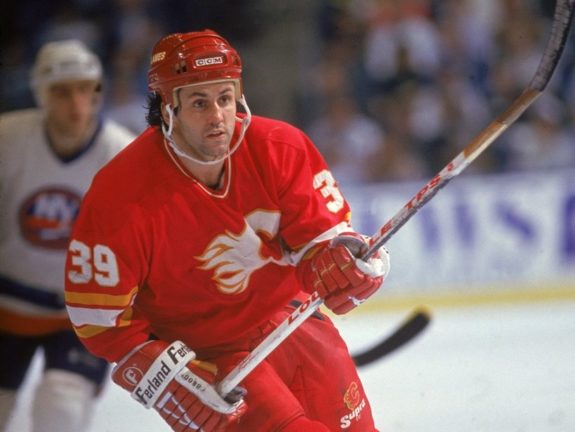
Interestingly, out of all the players involved, Gilmour was the best player in the transaction, entering the Hockey Hall of Fame in 2011. Furthermore, two players in the deal would win the Stanley Cup with other Original Six franchises, Leeman (Montreal, 1993) and Macoun (Detroit, 1997). Additionally, Berube won a championship as the head coach of the St. Louis Blues in 2019.
Flames Execute Eight Trades at 2001 NHL Entry Draft
In 43 years, the Flames have signed off on 313 trades, with multiple deals (two or more) occurring on a single day. Thus far, the team has 32 days in which they made several transactions within hours of each other. However, there has never been a busier time than on June 23/24, 2001, when the franchise called in eight separate trades during the 2001 NHL Entry Draft.
First, the Flames sent Burke Henry to the New York Rangers for Chris St. Croix, followed by a big deal with the Florida Panthers involving Rob Niedermayer and a 2001 second-round pick (#56 Andrei Medvedev) for Valeri Bure and Jason Weimer. Additionally, they sent Roman Turek and a 2001 fourth-round pick (#124 Igor Shastin) to the Blues for Fred Brathwaite, Daniel Tkaczuk, Sergei Varlamov, and a 2009 ninth-round pick (#270 Grant Jacobsen). Then, to cap the day off, they swapped draft picks with the Arizona Coyotes, acquiring a 2001 first-round pick (#14 Chuck Kobasew) and 2001 second-round pick (#41 Andrei Taratukhin), for a 2001 first-round pick (#11 Fredrik Sjostrom).
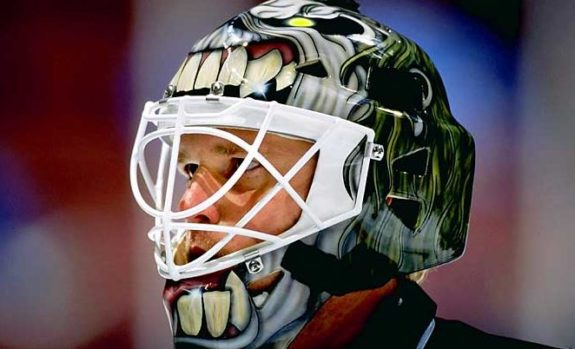
The next day, they were busy on the phones again, with the first deal happening with the Red Wings, acquiring a 2001 fifth-round pick (#164 Yuri Trubachev) and 2001 seventh-round pick (#226 Pontus Petterstrom) for a 2001 fifth-round pick (#157 Andreas Jamtin). Then, the team orchestrated another deal with the Rangers, swapping their 2001 seventh-round pick (#226 Pontus Petterstrom) for a 2002 seventh-round pick (#207 Pierre Johnsson). Furthermore, the team kept making deals with Eastern Conference teams, acquiring a 2002 fourth-round pick (#105 Rosario Ruggeri) for their recent 2002 seventh-round pick (#207 Pierre Johnsson). Finally, the Flames ended their two-day retooling project with the Columbus Blue Jackets, acquiring the rights to Paul Manning for Dean McAmmond.
Even though the Flames have made deals on consecutive days throughout their history, there has never been a busier time than eight deals in 48 hours at the 2001 NHL Entry Draft in Sunrise, Florida.
The Flames Have a Tendency to Trade Away Their Captains
Since relocating to Calgary in 1980, there have been 16 players to serve as team captains of the Flames. Interestingly, the franchise traded away seven of those players while they were wearing the “C” on their jerseys. The team has yet to have a designated captain since letting Mark Giordano depart in the Kraken Expansion Draft in 2021 and has only had two leaders in the last 20 seasons.
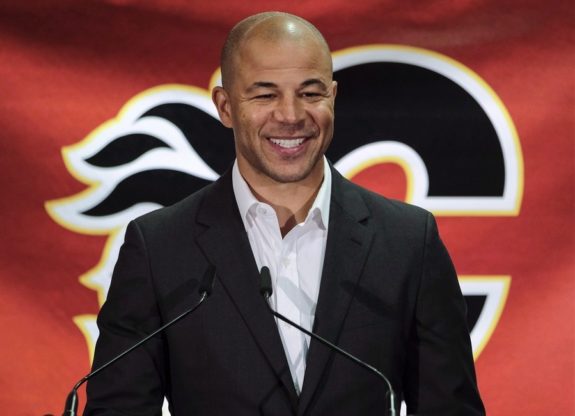
The first captain of the Flames in their new home was Brad Marsh, who came along with the Atlanta team in 1980 before being dealt to the Philadelphia Flyers on Nov. 11, 1981. Shortly after, Phil Russell earned a turn as captain, serving in the role for two seasons before a trade to the New Jersey Devils on June 20, 1983.
After winning the Stanley Cup in 1989, there was significant turnover with the team’s leadership core, and Brad McCrimmon became captain, only to be dealt to the Red Wings after one season on June 15, 1990. Shortly after, Joe Nieuwendyk ascended to the captaincy, but after four seasons and a nasty contract dispute, he wound up getting traded to the Dallas Stars on Dec. 19, 1995. Soon, Todd Simpson, who served as captain for two seasons, was headed to the Florida Panthers in a deal on Sept. 30, 1999.
Related: Calgary Flames | Seven Worst Trades in Franchise History
Eventually, the Flames cycled through four captains after Simpson, with Bob Boughner splitting the duties with Craig Conroy from 2001-03. However, Boughner ended up traded to the Carolina Hurricanes on July 16, 2003, leaving another captain vacancy.
Ultimately, the longest-serving captain in team history, Jarome Iginla, is also the latest Flames captain traded, with a deal involving the Pittsburgh Penguins occurring on March 28, 2013. Although the deal was heartbreaking for many fans, the move allowed him to chase a Stanley Cup ring, which eluded him during his tenure in Calgary.
A Deeper Analysis of Flames’ Trade History
Upon moving to Calgary, the very first deal in team history occurred on June 2, 1980, when the Flames acquired Olympic gold medalist Jim Craig from the Boston Bruins in exchange for a 1980 second-round pick (#39 Steve Konroyd) and a 1981 third-round pick (#56 Mike Vernon). Meanwhile, their latest trade took place on Aug. 18, 2022, when the Canadiens acquired Sean Monahan and a 2025 first-round pick from the Flames for future considerations. Although the official trade still needs to be completed, pending the outcome of the 2026 NHL Draft Lottery, the Flames acquired cap space to sign new players Jonathan Huberdeau and Nazem Kadri.
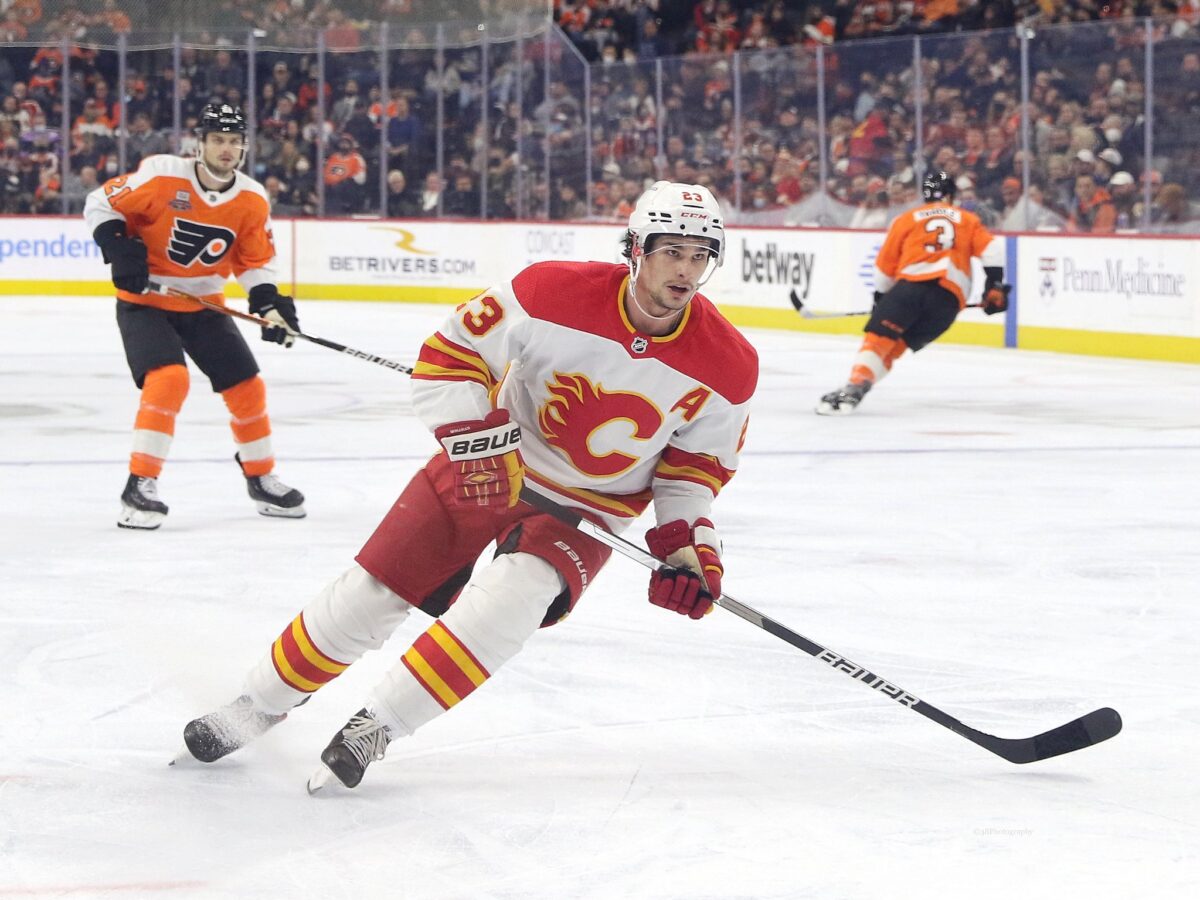
Interestingly in 43 years, the Flames average seven trades a season, with 2013 ranking as their busiest year with 15 deals. Between 1998 and 2003, the franchise orchestrated at least ten deals a year, the most extended period for such a high turnover. Surprisingly, in 1984, the Flames did not acquire anybody through the trade market, marking the only time in franchise history this occurred. Furthermore, it wasn’t until 1995, when they pulled off ten trades, that the team reached double digits, a figure they have avoided since 2013.
Even if the Flames do not make any adjustments in the next two weeks before the 2023 Trade Deadline, they have a long history of making moves in the offseason. Overall, if their record is any indication, there is always a chance to fix things in the coming months and be better equipped for the next season.